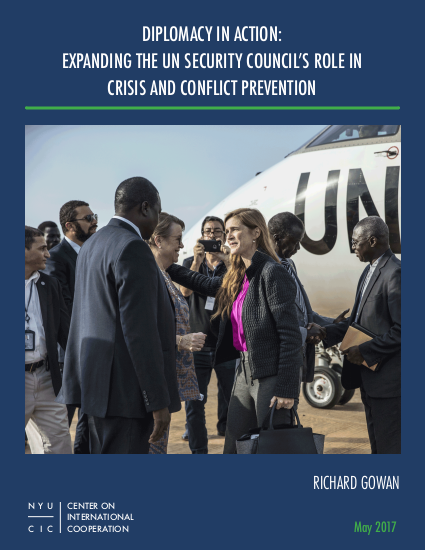
The UN Security Council has the potential to play a greater direct role in crisis response and mediation not only in New York, but in the field. It has done so sporadically in the past. In its early years, the Council experimented with inter-governmental missions to investigate potential conflicts and undertake mediation in cases including the Balkans and Indonesia. In the post-Cold War period, Council missions engaged directly in crisis diplomacy in multip=le conflicts, playing an important peacemaking role in East Timor in 1999. States outside the Council contributed to these efforts through Groups of Friends. Yet the Council has frequently handed off conflict prevention and resolution to the Secretary-General and other UN officials, or allowed other organizations or states to take the lead in responding to looming conflicts.
Despite current political frictions, Council members would like to engage more directly in some situations on its agenda. 2016 saw Council missions to Burundi, South Sudan and the Democratic Republic of Congo. These have had limited impact due to strategy and procedural differences among participants, in addition to weak follow-up. The Secretary-General should not view increased Council activism as a challenge to his own work, but look for ways to support and harness efforts by Council members to address looming crises. The Council should streamline its working methods and operational approaches to engaging in conflict prevention through:
- Adopting a new range of discussion formats for (i) informal discussions of long-term risks and mega-trends affecting international security; and (ii) how members of the Council can individually or collectively use their good offices alongside existing UN diplomacy to prevent conflicts.
- Strengthening the Council’s conflict prevention capacities by (i) streamlining Council missions, relying on smaller numbers of ambassadors to represent the organization; (ii) learning lessons from the early days of Council diplomacy by employing inter-governmental committees and commissions to investigate crises and mediate; and (iii) working with the UN secretariat to “mix and match” UN officials and Council diplomats in peacemaking processes to maximize their shared leverage.
- Boosting the Council’s ability to conduct direct crisis diplomacy by (i) launching a new Council working group on conflict prevention globally; (ii) mandating the Military Staff Committee to look at ways in which it could use defense diplomacy to avert or mitigate conflicts; and (iii) encouraging states outside the Council to participate in Groups of Friends focusing on specific country issues.